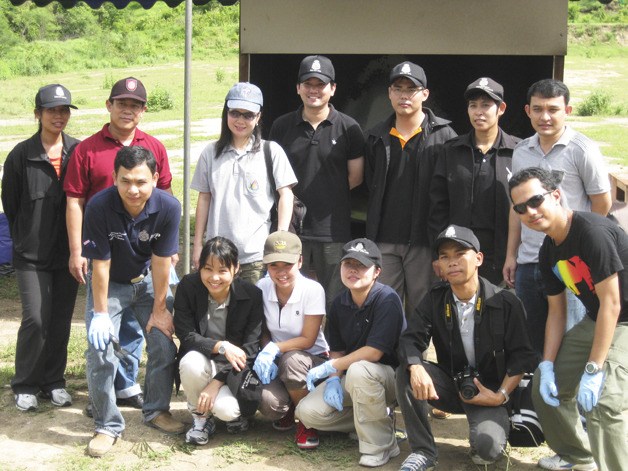When it comes to fighting fires, Thailand faces enormous challenges.
Josh Rogers understands this better today.
Rogers, 37, a deputy fire marshall investigator for the Valley Regional Fire Authority, recently discovered just how difficult it is for a developing nation to provide fire safety to its massive population. He recently spent three weeks in Southeast Asia as part of a team of fire investigators from South King County called upon to teach basic fire investigation to 120 Royal Thai Police and forensic technicians.
For Rogers, the experience half a world away widened his perspective and increased his understanding of one country in need, the other willing to give.
“It made me very appreciative of the systems that we have in place here, as far as the safety goes for our employees and the general attitude of us being so proactive,” said Rogers, a 15-year firefighting veteran who is part of a fire investigation task force that the VRFA and the Kent Regional Fire Authority started and support.
For a developing nation, fire safety, suppression and investigation have significant room to grow. As Rogers puts it, fire safety is “reactive rather than proactive” in Thailand. But, as he sees it, the next generation of police and fire personnel are motivated to change the country’s ways.
Firefighters from the U.S., as part of a federally-backed training program, are willing to help the country bridge the gap. Advances – from procedures to equipment – are on the way.
Bangkok, a city of more than nine million people, has 34 fire stations covering 605 square miles. Comparatively speaking, the Seattle Fire Department has 34 fire stations, serving a population of approximately 600,000 people spread out over 91 square miles.
With so much distance to cover and contentious heavy traffic, firefighters rarely arrive in time to save a building from a fire, Rogers noted. They simply try to keep the fire from spreading, often leaving heavy damage and little evidence for investigators to sift through to determine a cause.
“And they typically have a heavy case load, probably five or six cases a day for a crew,” Rogers said.
Also, Thai people are so frightened by fire that they usually leave the damaged structures and never return, Rogers said. Fire-damaged buildings quickly are covered by fences decorated with murals or advertising. Storefronts often are built to mask the fire damage.
Many household appliances and commercial building codes, Rogers observed, are not held to “proactive” standards.
Investigations are further complicated by the lack of witnesses. Because of the heavy volume of cases, incidents often are processed too quickly, Rogers said. Thai investigators need to “slow down,” Rogers insisted, to process more details to gain a better picture of a fire’s probable cause.
Despite the challenges, Rogers and his team helped police with the investigation of several commercial building fires, using them as a teaching tools for officers.
With the help of interpreters, the class proved to be a quick study, Rogers said.
“The Thai students were very educated. Most of them had bachelor’s degrees, master’s degrees, even PhDs,” Roger said. “I was impressed with how well they grasped the concepts we were teaching while combining it with their already proven methods of crime scene investigation.”
At the time of the visit, southern Thailand was dealing with a spree of arson fires owing to civil unrest, and police were ill prepared to conduct investigations.
Rogers said the civil unrest could be seen in one isolated downtown demonstration.
“It was a sea of red shirts,” he recalled. “The street was blocked off. You could tell the tensions were pretty high. It wasn’t an area you wanted to be in.”
Instructors were moved closer to the U.S. Embassy and spent a weekend in a nearby hotel as a precaution.
Instruction outside the classroom took Rogers’ team to a remote area called Cha-am to conduct practice investigations.
“The burn exercises were literally in the middle of the jungle. We saw elephants and monkeys from the car windows on the drive down there,” Rogers said.
“We were told not to venture out of the clearing we were in. Unexploded land mines were very common in that area due to the civil unrest,” Rogers added.
Despite brutally humid conditions and the language barrier, Rogers said it was a mission accomplished.
Rogers – joined by VRFA investigator Eric Pedersen – plans to return in March to provide more advanced training. It is the continuation of a partnership program between Washington state and Thailand law enforcement. A group of investigators from the Tukwila Fire Department made the inaugural training trip last May, laying the groundwork for their colleagues.
Rogers says the continued effort is good for both sides.
“(The exchange) shows you how to look at things differently,” he said. “Not that we do things the right way, but how we do things differently.”
Kimberly McDonald, VRFA public information officer, contributed to this article.


